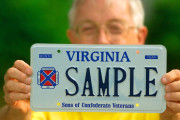This fall, 21-year-old Jurnee Farrell, a Howard University senior and a member of the university’s volleyball team, was set to play in the Mid-Eastern Athletic Conference Tournament.
But instead, she was sidelined … by a decision she made herself.
Two years ago, she signed up with Be the Match, a nonprofit that registers potential bone marrow and stem cell donors. When she got the call that she was a match for a 57-year-old woman with a form of leukemia, she was surprised.
“At first I was like, ‘This isn’t real,’” Farrell recalled, but then said her decision was clear. She would follow through on the commitment she made two years ago when she signed up.
That meant undergoing a series of shots five days before the outpatient procedure, and then undergoing apheresis, a process in which the donor has blood removed through a needle in one arm, blood-forming cells are collected, and then the blood is returned through a needle in the other arm. The session can take up to eight hours.
Farrell said that the actual donation wasn’t bad, but that the shots — given in a series five days prior — proved a little uncomfortable.
Nevertheless, she urges potential donors to sign up.
“It’s really not that bad, and the person whose life you’re saving is probably going through so much more than you are,” she said.
And while Farrell missed the tournament last month, she’s back on the court already. “We are going to the NCAA tournament this weekend, actually, and we play Pitt on Friday,” she said. “I just started practicing last week!”
Farrell’s decision to register as a donor is one for which the staff at Be the Match is especially grateful.
Lauren Mueller, a public relations specialist with Be the Match, explained that for Caucasian patients waiting for a bone marrow or stem cell donation, the odds of finding a match are roughly 70%. For African-American patients, the odds are much lower, at 23%.
As a result, “we are always looking to increase our diversity on the registry,” said Mueller, who encourages people to consider registering.
It starts with a cheek swab, and Mueller said it’s not uncommon for years to go by before a potential donor hears that they might be a match, just as it was in Farrell’s case.
“Your selfless action can help save a life,” Mueller said.
Farrell said that she’s hopeful her donation will prove successful, and that she would love to meet the recipient one day.








